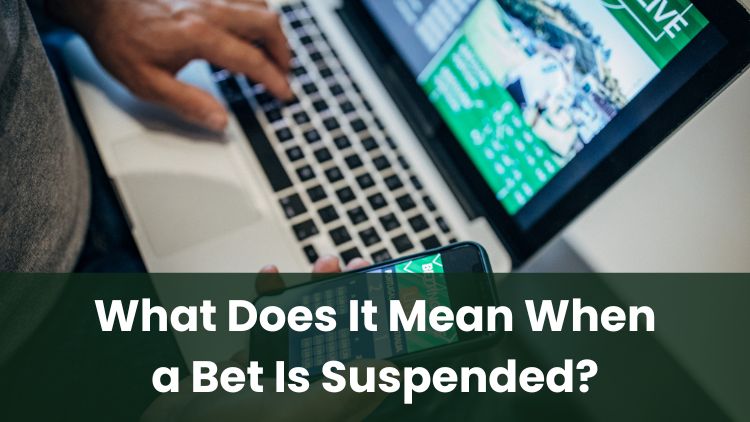
If you’ve ever tried to place a bet online and suddenly noticed that the market has gone greyed out, or displays the message “suspended”, it can leave you wondering what just happened.
This guide will explain what it means when a bet is suspended, why bookmakers pause markets, and what it could mean for you as a bettor.
If you’re new to online sports betting, you may not be familiar with the terms or processes involved. This blog breaks things down clearly, without using complicated jargon. Whether you're watching football, tennis or horse racing, understanding how suspended bets work can help you make more informed decisions. It’s not about knowing the outcome—it’s about understanding the process, so you’re not caught off guard.
How Do Suspended Bets Work at Bookies?
If a bet is suspended, it means the bookmaker has temporarily stopped accepting bets on a specific market. This is most common during in-play or live betting—where odds are updated in real time as the event unfolds.
For example, during a football match, the bookmaker may suspend bets when a goal is scored, a penalty is awarded or a red card is shown. These events can have a major impact on the odds, so suspending the market gives the bookmaker time to recalculate prices based on the latest developments.
Outside of football, it also happens in other sports. In tennis, the market might be suspended while a point is under review. In horse racing, bets may be paused if there’s a delay at the starting gate or a stewards’ inquiry during the race.
Suspensions help keep things fair and accurate. Once the situation has been assessed and the odds updated, the market may reopen.
The time this takes can differ between bookies. Some might have faster data feeds or automated systems, while others may take longer, especially for smaller or niche events. You might notice the same market available again within seconds, or not until the end of the event, depending on the circumstances.
Main Reasons Bookies Pause or Stop Betting
There are several reasons a bookmaker might suspend a market. These are usually tied to changes in the event, or operational issues behind the scenes.
-
Key In-Game Moments: Betting is often suspended during moments that can significantly influence the outcome. In football, if a player is about to take a clear shot on goal, the bookmaker might suspend the market just before the attempt. This stops people from placing bets based on a moment that could quickly change the outcome, keeping the odds fair and up to date.
-
Technical Interruptions: Sometimes, technical problems—either on the bookmaker’s end or with the data feed from the event—can cause a temporary suspension. This ensures that bets aren’t taken using out-of-date or incorrect information.
-
Market Closing Naturally: As a match or race approaches its end, certain markets may close. For example, “First Goalscorer” would be closed once a goal is scored, and “Next Goal” might be unavailable near the final whistle.
-
Suspicious or Unusual Activity: If a bookmaker notices a spike in bets on a specific outcome—especially at unusual stakes or in lower-profile events—it could be a sign of insider knowledge or attempted manipulation. In such cases, suspending the market allows time for further checks.
-
Awaiting Official Confirmation: In sports where decisions are made using technology or review systems, like VAR in football or Hawk-Eye in tennis, the market may be suspended until the decision is final.
Bookmakers use a combination of live data, risk monitoring tools and trader oversight to decide when to pause or close markets. These systems can differ between betting companies, so market availability can vary. It may be worth checking the betting rules on your chosen platform to better understand how they manage any suspensions.
Do You Get Your Money Back on a Suspended Bet?
Seeing a market suspended doesn't mean your existing bet has been cancelled. If you placed a bet before the suspension and received confirmation (usually shown in your bet slip or account history), your bet will still stand and be settled based on the outcome of the event.
However, if you tried to place a bet while the market was in the process of being suspended, your bet may not have gone through. In this case, no money would be taken, and the bet shouldn’t appear in your history. You might see a message saying the bet was unsuccessful or that the odds changed before placement.
In certain situations, a bet might be voided. This could happen if there was a major technical fault, an incorrect price was offered, or the event was disrupted or cancelled. In these cases, bookmakers typically return your original stake. If this happens, your betting history should show the wager marked as "void" or "cancelled".
There’s no single rule across all bookies. Each bookmaker sets out their own procedures for bet acceptance, settlement, and suspension in their terms and conditions. If you’re ever unsure about what’s happened to a bet, you can usually find the relevant details in your account or by contacting customer support.
Sports betting involves chance, and no outcome is guaranteed. Every bet carries a risk, so it’s important to only bet in a way that works for you.
UK-licensed bookmakers offer tools like deposit limits, time-outs and access to support. If betting stops being enjoyable, help is available from your bookmaker or organisations like GambleAware and GamCare.
Knowing how things like suspended markets work can help you make more informed choices.
*All values (Bet Levels, Maximum Wins etc.) mentioned in relation to these games are subject to change at any time. Game features mentioned may not be available in some jurisdictions.
**The information provided in this blog is intended for educational purposes and should not be construed as betting advice or a guarantee of success. Always gamble responsibly.
